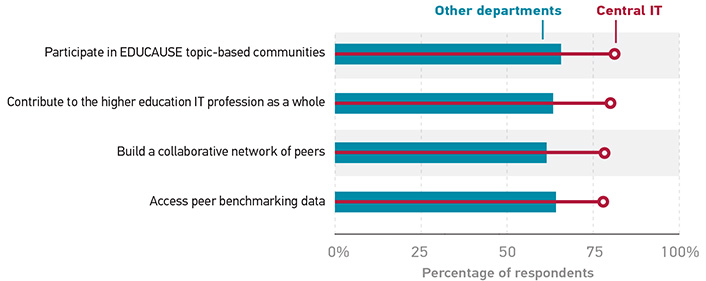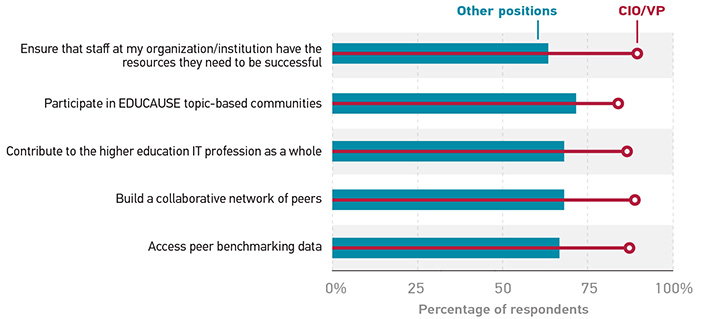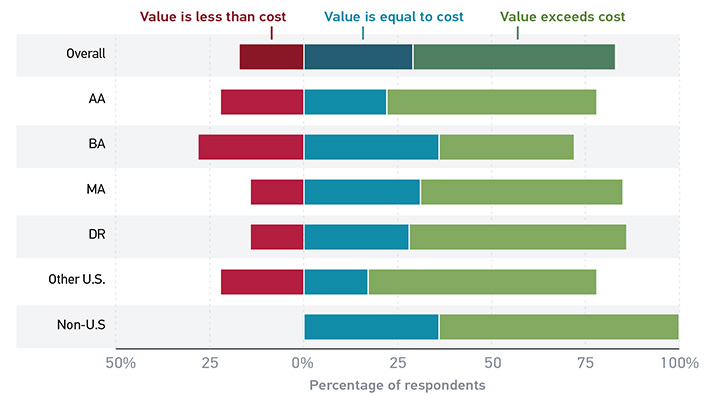A survey of the EDUCAUSE membership reveals differences in interests and needs.

"Difference does not diminish; it enlarges the sphere of human possibilities."
—Jonathan Sacks
In our own ways, EDUCAUSE continues to venture into the exciting possibilities brought about by difference, as we aim to serve members from many different institutional contexts and with many different professional identities, interests, and needs. In what ways can EDUCAUSE better serve and enrich non-management staff experiences? How can EDUCAUSE better serve community college members and institutions? How might diversity, equity, and inclusion (DEI), in all its many expressions, help give shape to EDUCAUSE resources and programming? These are worthy questions to address, and EDUCAUSE is committed to pursuing solutions in the months and years ahead through our personalization and member profile initiatives and through our DEI initiative, among other programs and services.
Through the EDUCAUSE membership survey conducted earlier this year, members clearly expressed the need for our association to meet them where they are, in their particular institutional environments, and with their respective professional interests and challenges. This need was reflected through a number of survey response patterns we observed between different member types. Members representing a central IT department at their institution, for example, more frequently cited various benefits as motivators for participating in EDUCAUSE than did respondents from all other department types, as illustrated in figure 1.

Likewise, members in CIO or VP roles at their institution cited those same benefits (plus one additional benefit) as motivators for participation more often than did members in other institutional roles, as shown in figure 2.

When asked about the importance of and their satisfaction with specific EDUCAUSE benefits and services — such as our Constituent Group programming and peer benchmarking services (e.g., Core Data Service) — central IT and CIO/VP members again provided more positive ratings of both importance and satisfaction than their comparison groups. Even in general evaluations of the overall value of EDUCAUSE membership relative to its cost, summarized in figure 3, we received more positive responses from some member types (among members from DR institutions, 58% said the value of membership is greater than the cost) compared to other member types (36% among members from BA institutions).

What do we make of these and other contextual and personal differences that emerged from this member feedback? First, it is reasonable that some resources would be more beneficial to certain types of members than to others, simply due to the focus and purpose of those resources. Institutions of different types and sizes simply carry with them different sets of concerns and challenges, as do individuals of different professional roles and identities. Benefit and service needs among our membership, therefore, are both wide ranging and highly specialized, and the depth at which any single resource can speak to the full breadth of people and institutions we serve will be limited.
Perhaps the challenge to EDUCAUSE is more of form and delivery than of content — a challenge EDUCAUSE is currently exploring through several additional lines of member research. Among our membership, there exists a cacophony of institutional and professional voices. A univocally formatted and delivered research report or professional development opportunity, for example, would fail to adequately speak to the full range of EDUCAUSE member experiences and needs. To the extent that we gloss over these important differences in our membership, we miss opportunities to meet members where they are and speak to their contextual and personal interests. And to the extent that we diversify and add nuance to our work, we enhance our relevance and impact for our members' professional thriving.
There are exciting opportunities on the road ahead to offer the EDUCAUSE member more contextual and personal resources, and the EDUCAUSE association is committed to exploring and pursuing those opportunities. Through redesigning our Core Data Service portal, generating more concise and targeted research reports and infographics, and reaching out and partnering with specialized member communities and associations, the Analytics Services and Research teams, for example, are working to ensure that the resources we provide arrive in ways that are truly relevant, contextual, and personal. More broadly, through the EDUCAUSE association's member profile and personalization initiatives, our association is working to stage an EDUCAUSE member experience through which members will truly be able to find their own identity and needs in the services and resources we provide.
Mark M. McCormack is Senior Director of Analytics and Research at EDUCAUSE.
© 2018 Mark M. McCormack. The text of this work is licensed under a Creative Commons BY-NC-ND 4.0 International License.
